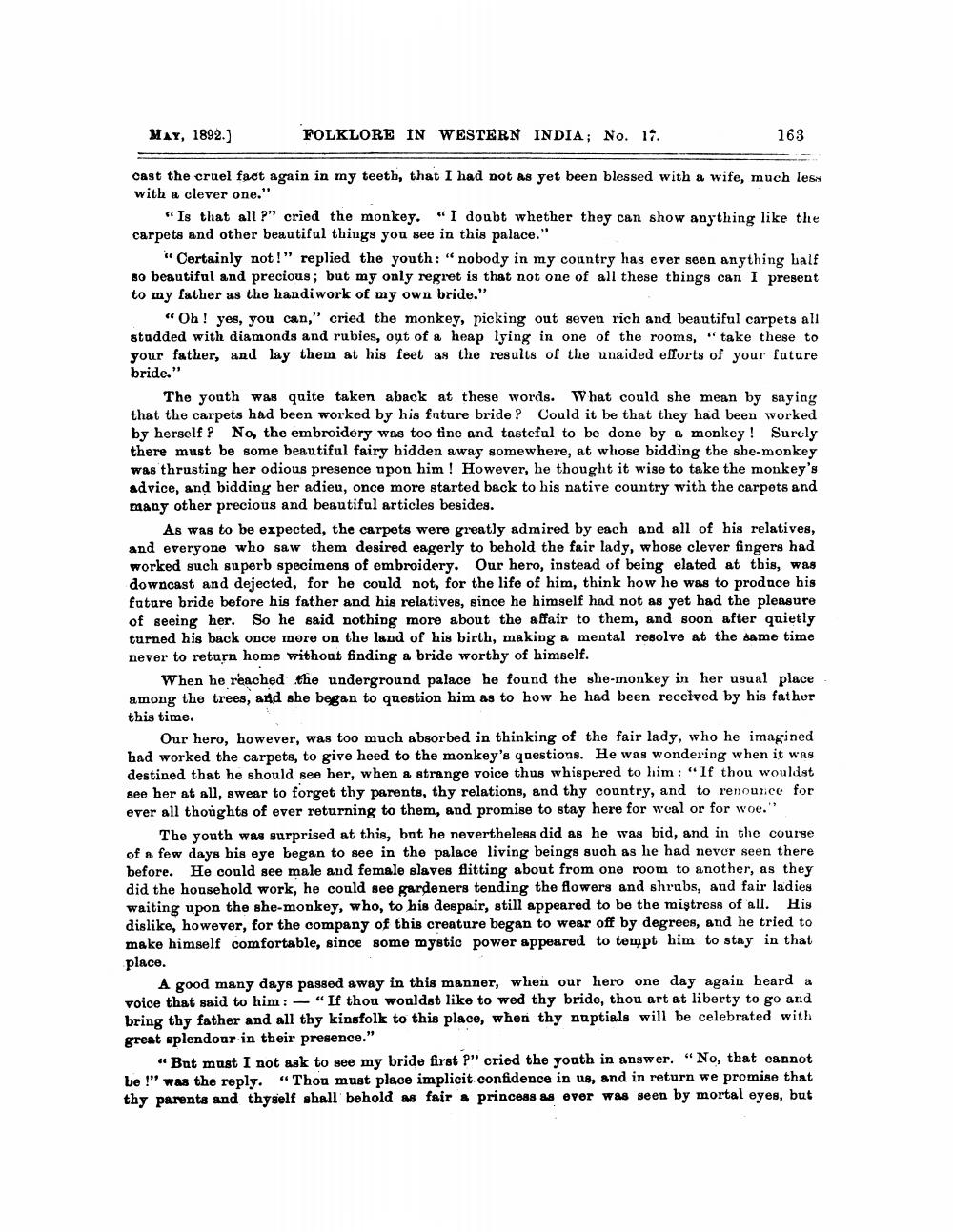________________
MAY, 1892.)
FOLKLORE IN WESTERN INDIA; No. 17.
163
cast the cruel fact again in my teeth, that I had not as yet been blessed with a wife, much less with a clever one."
“Is that all P" cried the monkey. “I doubt whether they can show anything like the carpets and other beautiful things you see in this palace."
*Certainly not!" replied the youth: " nobody in my country has ever seen anything half 80 beautiful and precious; but my only regret is that not one of all these things can I present to my father as the handiwork of my own bride."
« Oh! yes, you can," cried the monkey, picking out seven rich and beautiful carpets all studded with diamonds and rubies, out of a heap lying in one of the rooms, "take these to your father, and lay them at his feet as the resalts of the unaided efforts of your future bride."
The youth was quite taken aback at these words. What could she mean by saying that the carpets had been worked by his future bride ? Could it be that they had been worked by herself ? No, the embroidery was too tine and tasteful to be done by a monkey! Surely there must be some beautiful fairy hidden away somewhere, at whose bidding the she-monkey was thrusting her odious presence npon him! However, he thought it wise to take the monkey's advice, and bidding her adieu, once more started back to his native country with the carpets and many other precious and beautiful articles besides.
As was to be expected, the carpets were greatly admired by each and all of his relatives, and everyone who saw them desired eagerly to behold the fair lady, whose clever fingers had worked such superb specimens of embroidery. Our hero, instead of being elated at this, was downcast and dejected, for he could not, for the life of him, think how he was to produce his fatare bride before his father and his relatives, since he himself had not as yet had the pleasure of seeing her. So he said nothing more about the affair to them, and soon after quietly turned his back once more on the land of his birth, making a mental resolve at the same time never to return home without finding a bride worthy of himself.
When he reached the underground palace he found the she-monkey in her usual place among the trees, and she began to question him as to how he had been received by his father this time.
Our hero, however, was too much absorbed in thinking of the fair lady, who he imagined had worked the carpets, to give heed to the monkey's questions. He was wondering when it was destined that he should see her, when a strange voice thus whispered to him: "If thou wouldst see her at all, swear to forget thy parents, thy relations, and thy country, and to renource for ever all thoughts of ever returning to them, and promise to stay here for weal or for woe."
The youth was surprised at this, but he nevertheless did as he was bid, and in the course of a few days his eye began to see in the palace living beings such as he had never seen there before. He could see male and female slaves flitting about from one room to another, as they did the household work, he could see gardeners tending the flowers and shrubs, and fair ladies waiting upon the she-monkey, who, to his despair, still appeared to be the mistress of all. His dislike, however, for the company of this creature began to wear off by degrees, and he tried to make himself comfortable, since some mystic power appeared to tempt him to stay in that place.
A good many days passed away in this manner, when our hero one day again beard a voice that said to him: - "If thou wouldet like to wed thy bride, thou art at liberty to go and bring thy father and all thy kinsfolk to this place, when thy nuptials will be celebrated with great splendoar in their presence."
"But must I not ask to see my bride first P" cried the youth in answer. “No, that cannot Le !" was the reply. “Thou must place implicit confidence in us, and in return we promise that thy parents and thyself shall behold as fair a princess as ever was seen by mortal eyes, but




